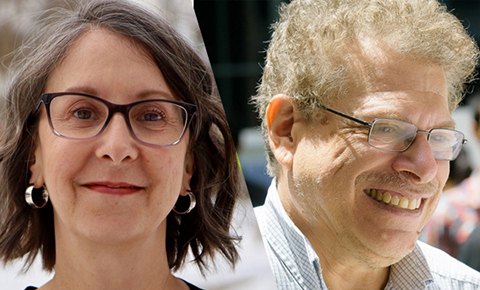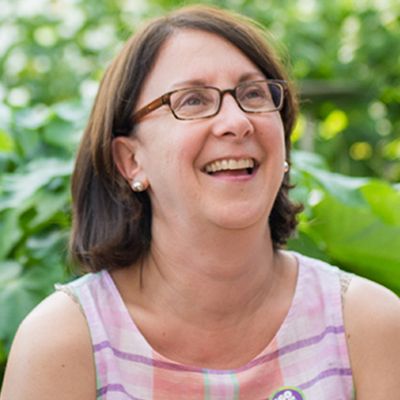Two Faculty Members Elected to National Academy of Education

Northwestern University learning scientists Miriam Sherin and Uri Wilensky were among 17 exceptional scholars elected to the prestigious National Academy of Education (NAEd) for their outstanding work in education scholarship and research.
It’s the third consecutive time the School of Education and Social Policy has had two winners in the same year and the fourth overall. Last year, Megan Bang, Jonathan Guryan, and Brian Reiser were elected, the first time in School history that three faculty members joined in one year.
Overall, the School of Education and Social Policy now has 17 National Academy members, including ten in the last six years under Dean David Figlio. The remaining members include Lindsay Chase-Lansdale, Cynthia Coburn, Allan Collins, Figlio, Larry Hedges, Kirabo Jackson, Carol Lee, Doug Medin, Penelope Peterson, Diane Schanzenbach, Morton Schapiro, and Jim Spillane.
Sherin is best known for her research on “teacher noticing” – how teachers make decisions about what to attend to in the moments of instruction. She has also pioneered the use video to help teachers see how students think.
Wilensky, the Lorraine H. Morton Professor of Learning Sciences and Computer Science, is the father of a worldwide movement to harness the power of computer modeling and simulations and foster the mindset known as “computational thinking.”
 About Sherin: Sherin, the Alice Gabrielle Twight Professor of Learning Sciences, is a leading researcher on what it means for teachers to “learn to notice” so they can support student learning. Much of her work has explored how to use video to study how teachers cultivate these observational skills.
About Sherin: Sherin, the Alice Gabrielle Twight Professor of Learning Sciences, is a leading researcher on what it means for teachers to “learn to notice” so they can support student learning. Much of her work has explored how to use video to study how teachers cultivate these observational skills.
Video is a powerful way to “freeze human behavior on the scale of moments or minutes or seconds that’s just the scale it’s happening in the classroom,” she says. “Even early on, videotaping in classrooms wasn’t just seen as a method for researchers to study classrooms, but as a helpful teaching tool. It raised a lot of questions: What is the right thing to do with video and teachers? What might video help teachers learn?”
In a recent issue of Phi Delta Kappan, Sherin and School of Education and Social Policy coauthors Jennifer Richards and Mari Altshuler explained how video helps teachers notice things about their classrooms that are difficult to observe while they’re teaching.
“Talking with colleagues about videos allows them to share differing perspectives and gain new insights,” they write. “But the very act of creating videos of their own classrooms can help teachers improve their capacity to notice, even without group discussion.”
In the Provost’s office, Sherin works to enrich the educational experiences of Northwestern’s 8,000 undergraduate students through collaborative cross-school and cross-unit undergraduate initiatives. Her priorities include supporting students who are underrepresented minorities, first-generation, and/or low income.
Sherin joined the Northwestern faculty in 1997 and has served in several leadership roles during her more than 20 years with the School of Education and Social Policy, including director of undergraduate education and associate dean for teacher education. In 2016, Sherin received the Outstanding Publication Award for Linking Research and Practice from the National Council of Teachers of Mathematics.
Sherin earned her PhD in science and mathematics education from the University of California, Berkeley. She received her bachelor’s and master’s in mathematics from the University of Chicago and the University of California, San Diego respectively.
Influential Research:
- Learning to notice: Scaffolding new teachers’ interpretations of classroom interactions
- Mathematics Teacher Noticing: Seeing through teachers’ eyes
- Effects of video club participation on teachers' professional vision
- Learning from recording video of your own classroom
About Wilensky:
An early advocate of integrating computation into all school subjects, Wilensky is the founding director of the Center for Connected Learning and Computer-Based Modeling. He is also the founding co-director of the Computer Science/Learning Sciences PhD program and co-founder of the Northwestern Institute on Complex Systems.
Wilensky was a pioneer in recognizing the importance of complex systems theory in education and developing methods to study it. Wilensky’s early work analyzed the difficulties learners have in understanding complex systems. He argued that as our world is getting more interconnected and complex, making sense of complexity is a critical skill for our time.
Wilensky hypothesized that the power of computing can be harnessed to give learners interactive exposure to complexity and let them to experiment with it to make sense of complex patterns in nature and society. To that end, Wilensky developed the award-winning programming language NetLogo, the most widely used agent-based modeling environment in the world.
NetLogo allows people to construct computational models from large numbers of small pieces called agents. It comes with more than 400 vetted models in its models library, which learners can use to explore, modify and build their own versions. Wilensky and his colleague William Rand co-authored the standard textbook on learning agent-based modeling methods across a variety of disciplines.
Hundreds of thousands of students, teachers, and researchers use NetLogo to tackle complex ideas ranging from the formation of crystals and galaxies to the patterns of wealth distribution, inequality, and segregation in a city.
Wilensky has championed the integration of computational modeling and computational thinking across all school subjects. Studies from his lab and others over the last decade suggest that it is much easier to train teachers in computational thinking in their subject areas–such as chemistry or history–than to educate and retain full-time computing teachers. Since this strategy involves all subject areas, it ensures that all students, including traditionally underrepresented groups, will have access.
The Center for Connected Learning doesn't just develop computer-modeling-based curricula; it partners with teachers to help them implement it into classrooms. Their work has shown that students who study subjects integrated with computation improve their computational thinking, think more deeply about their subjects, and can deal with complex content at younger ages, according to Wilensky.
“Confusion about human problems often stems from the difficulty in comprehending complex systems,” Wilensky says. “We cannot ignore computational thinking, especially in our increasingly complex world. These are the skills students will need to thrive as adults, and moreover, these skills help students with their other subject areas. By integrating computing across all classes, we can make it a true literacy.”
Wilensky earned his doctorate in media arts and sciences at the Massachusetts Institute of Technology. He received his bachelor’s and master’s degrees in mathematics and philosophy at Brandeis University.
Read more about Wilensky in SESP magazine.
Influential Research: